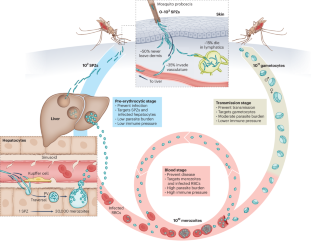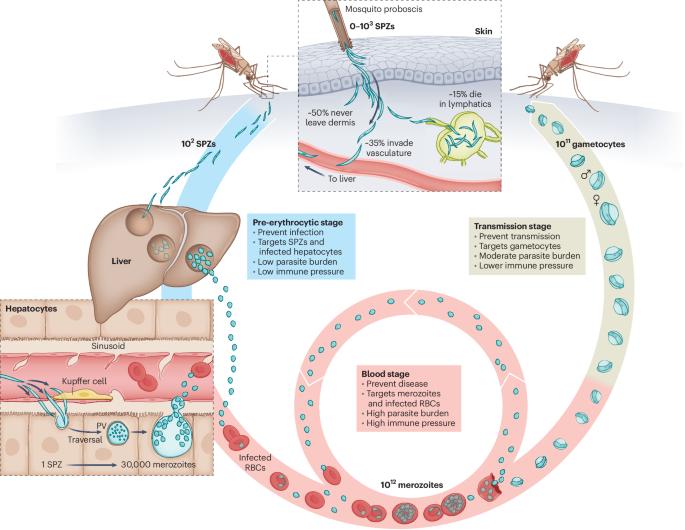环孢子虫蛋白单克隆抗体作为预防疟疾的新兴工具
IF 27.7
1区 医学
Q1 IMMUNOLOGY
引用次数: 0
摘要
尽管采取了各种公共卫生战略,但恶性疟原虫引起的疟疾仍然是全球健康面临的重大挑战,需要开发新的干预措施。针对恶性疟原虫孢子虫(疟原虫的感染形式)上的环孢子虫蛋白的半衰期延长的人类单克隆抗体可预防啮齿动物和人类的疟疾,并已进入临床开发阶段。单克隆抗体所针对的环孢子虫蛋白上的保护性表位已经确定。低温电子显微镜和多光子显微镜对抗体如何与环孢子虫蛋白结合并中和孢子虫进行了机制结构和功能研究。此外,生物信息学和抗体工程的创新也促进了抗体效力和持久性的提高。在此,我们总结了在了解环孢子虫蛋白单克隆抗体如何预防疟疾方面的最新科学进展,并重点介绍了现有临床数据和未来计划,即如何单独使用或与现有抗疟干预措施一起使用这一新兴干预措施来控制高危人群中的疟疾。本文章由计算机程序翻译,如有差异,请以英文原文为准。


Monoclonal antibodies to the circumsporozoite proteins as an emerging tool for malaria prevention
Despite various public health strategies, malaria caused by Plasmodium falciparum parasites remains a major global health challenge that requires development of new interventions. Extended half-life human monoclonal antibodies targeting the P. falciparum circumsporozoite protein on sporozoites, the infective form of malaria parasites, prevent malaria in rodents and humans and have been advanced into clinical development. The protective epitopes on the circumsporozoite protein targeted by monoclonal antibodies have been defined. Cryogenic electron and multiphoton microscopy have enabled mechanistic structural and functional investigations of how antibodies bind to the circumsporozoite protein and neutralize sporozoites. Moreover, innovations in bioinformatics and antibody engineering have facilitated enhancement of antibody potency and durability. Here, we summarize the latest scientific advances in understanding how monoclonal antibodies to the circumsporozoite protein prevent malaria and highlight existing clinical data and future plans for how this emerging intervention can be used alone or alongside existing antimalarial interventions to control malaria across at-risk populations. Seder and colleagues review the latest scientific advances in understanding how monoclonal antibodies to the circumsporozoite protein prevent malaria and highlight how this emerging intervention can be used alone or alongside existing antimalarial interventions to control malaria across at-risk populations.
求助全文
通过发布文献求助,成功后即可免费获取论文全文。
去求助
来源期刊

Nature Immunology
医学-免疫学
CiteScore
40.00
自引率
2.30%
发文量
248
审稿时长
4-8 weeks
期刊介绍:
Nature Immunology is a monthly journal that publishes the highest quality research in all areas of immunology. The editorial decisions are made by a team of full-time professional editors. The journal prioritizes work that provides translational and/or fundamental insight into the workings of the immune system. It covers a wide range of topics including innate immunity and inflammation, development, immune receptors, signaling and apoptosis, antigen presentation, gene regulation and recombination, cellular and systemic immunity, vaccines, immune tolerance, autoimmunity, tumor immunology, and microbial immunopathology. In addition to publishing significant original research, Nature Immunology also includes comments, News and Views, research highlights, matters arising from readers, and reviews of the literature. The journal serves as a major conduit of top-quality information for the immunology community.
 求助内容:
求助内容: 应助结果提醒方式:
应助结果提醒方式:


